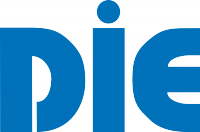Heinemannstr. 12-1453175 BonnGermanytel.: + 49 (0) 228 3294-0fax.: + 49 (0) 228 3294-399
Deutsches Institut für Erwachsenenbildung DIE
Aims, Mission and Goals
The German Institute for Adult Education’s socio-political focus is on the advancement of adult education in order to improve the personal development, social participation and employability for the adult population in Germany.
In accordance with its mandate, the DIE’s research is focused on two main targets: combining science and research of adult education and supporting them by supplying data and information as well as conducting research and development.
The DIE’s research activities cover all areas of continuing education: adult learning processes, didactic design of programmes, staff, continuing education institutions, and financial, political and legal aspects of the continuing education system. The DIE also picks up on current problems and issues.
The DIE’s service activities are the cornerstones of an academic infrastructure in the field of continuing education in Germany. This infrastructure includes statistical services, a specialised library, publications as well as research programmes for the conservation and maintenance of the subject-based memory. These are also continuously developed according to current needs.
The DIE also provides additional services for research and practice in adult and continuing education:
The DIE Forum on Continuing Education
The DIE Forum on Continuing Education is an integral part in the field of continuing education. During the annual conferences, the DIE addresses current and trend-setting issues of continuing education and makes suggestions for research and practice.
In 2008, the 11th Forum on Continuing Education was conducted on an international scale with a focus on literacy/basic education: Current Issues and Perspectives of Basic Education, National Questions within an International Discourse
The topic of literacy and basic education is increasingly attracting attention worldwide. The United Nations Literacy Decade (UNLD), international studies such as IALS and ALL as well as the preparations for PIAAC illustrate the relevance and currentness of the national and international educational debate.
The DIE Forum was aimed at discussing the international state of the art, evaluating common factors and determining options of transferability.
Innovation Prize in Continuing Education
The DIE has awarded the Innovation Prize in Continuing Education biennially since 1997 -– the "most renowned prize in adult education in Germany“ (Frankfurter Rundschau). As key criteria, the projects need to be innovative and field-tested, giving new impetus to adult education.
Structure of the institution
The main research focus is partitioned in two areas:
The Data and Information Centre (Daten- und Informationszentrum - DIZ) and The Research and Development Centre (Forschungs- und Entwicklungszentrum - FEZ).
The DIE’s scientific work is centralised in the Research and Development Centre (FEZ), which is partitioned in two programme areas: “System and Organisation“ and “Professional Development and Learning“.
“Professional Development and Learning“ provides the framework for four programme area - each with a different thematic focus . The program provides a systematic and consistent revision of academic issues, a professional and personal support for young academics and a demand and development orientated research in the individual subject areas.
Literacy and basic education are part of the programme area Social Inclusion/Community Education in Social Spaces.
Current lines of work
The programme Social Inclusion/Community Education in Social Spaces focuses on activities and projects in the field of literacy and basic education.
DIE broaches the issue of literacy/basic education including research, practice and politics and providing connectivity to international developments and trends.
Since the beginning of literacy and basic education in Germany during the 1980s, the DIE has conducted national and European research and development projects in this context.
The DIE is involved in national and international conferences, alliances and networks. In addition, the institute serves as an expert in the field of adult education.
Examples of Achievements
- The computer educational game «Winterfest» received the Lara Education Award ; the Serious Games Award and the European Award for Technology Supported Learning (eureleA)
- The EU-Grundtvig Project: Professionalization of Literacy and Basic Education-Basic Modules for Teacher training-TRAIN
Publications
In the field of literacy :
TRAIN
Module 1: Social Marketing Communications
Module 2: Principles of Adult Learning in the Field of Literacy and Basic Education
Module 3: Project Work at Literacy Learning and Basic Adult Education
Module 4: Individual learning and ICT Skills in Literacy and Basic Education
Module 5: Learning Counselling in Literacy and Basic Education
See TRAIN on the web
State of the art reports
Austria, Belgium, Cyprus, England, France, Germany, Ireland, Liechtenstein, Netherlands, Scotland, Slovenia, Switzerland, Wales.
See the State of the art reports on the web
ProfilPASS
See ProfilPASS on the web
Alpha – State of the Art
- Hussain, Sabina (2010): Erwachsenenalphabetisierung und Literalität in England – Ein Überblick über Entwicklungen in Politik und Wissenschaft, Bonn
- Hussain, Sabina (2010) : Konzeptionen von Literalität im Kontext von Migration – Good Practices aus Deutschland, Bonn
- Hussain, Sabina (2010) : Literalität und Numeracy in Norwegen – Ein Überblick über bildungspolitische Strategiepapiere und Maßnahmen, Bonn
- Hussain, Sabina (2009) : Das Konzept der Family Literacy – Good Practices aus Südafrika, Bonn
- Hussain, Sabina (2009) : Das Konzept des Dialogic Learning – Good Practices aus Spanien, Bonn
See Alpha – State of the Art on the web


